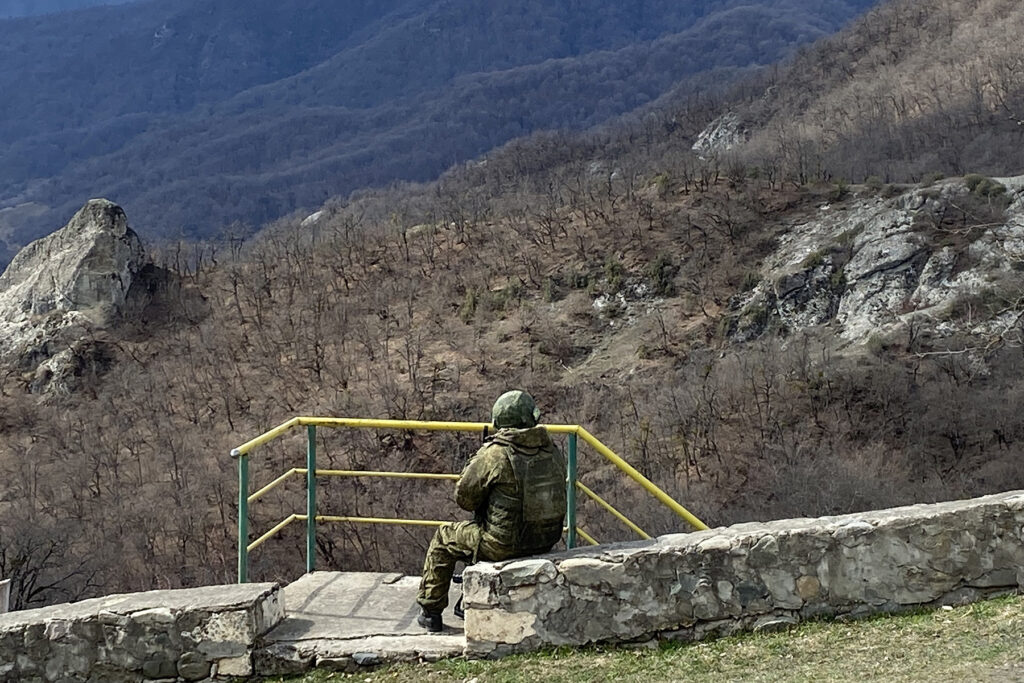Armenian Prime Minister Nikol Pashinyan has slammed the Russian peacekeeping mission in Nagorno-Karabakh, a day after deadly clashes left two soldiers from Nagorno-Karabakh dead.
In a cabinet meeting on Thursday, Pashinyan said it was ‘very necessary to adjust the details’ of the peacekeeping mission.
‘This was necessary from the beginning’, he added.
He cited several outbreaks of violence since the deployment of peacekeepers at the end of the Second Nagorno-Karabakh War in November 2020.
‘The capture of the villages of Khtsaberd and Hin Tagher by Azerbaijan on 11 December 2020, the capture of Armenian servicemen in the presence of and with the permission of peacekeepers of the Russian Federation, the capture of the village of Parukh on 24 March 2022 […] the continuous and deteriorating violations of the ceasefire regime along the line of contact, the cases of the physical and psychological intimidation of the Armenians of Nagorno-Karabakh […] are simply unacceptable’, Pashinyan said.
He said the mission needed to take into account that Azerbaijan had not signed off on its mandate, making it essentially a bilateral mandate signed by Armenia and Russia.
He suggested seeking international recognition of the peacekeepers, ‘to endow [them] with a wider international mandate’.
Pahinyan’s comments follow clashes in Nagorno-Karabakh on Wednesday that resulted in two dead and 19 wounded from the Armenian side and at least one dead Azerbaijani service member. Footage appeared to confirm that Azerbaijan used armed drones to strike several Armenian positions.
Azerbaijan said they were conducting a ‘revenge’ operation after their soldier was killed by members of illegal Armenian armed groups.
The Russian Ministry of Defence blamed Azerbaijan for breaking the ceasefire.
According to Russian state media Sputnik Armenia, Russian peacekeepers were deployed alongside ethnic Armenian troops from the region along the line of contact following Wednesday’s clashses.
Kremlin spokesperson Dmitry Peskov said on Thursday that Russia was ‘worried’ about the situation and called on all sides to ‘keep restraint’. Similar statements were made by the European Union and the Polish chairmanship of the OSCE.
Armenian troops and the Lachin corridor
Pashinyan also denied on Thursday that there were any ‘troops from the Republic of Armenia’ in Nagorno-Karabakh.
National Security Council head Armen Grigoryan had previously said that conscripts from Armenia who remained in Nagorno-Karabakh would be returned only by September.
Azerbaijani authorities have repeatedly insisted that Armenia was violating the ceasefire agreement by maintaining a military presence in the region.
Pashinyan also said that there would be no need for the Nagorno-Karabakh Defence Army ‘if the Russian peacekeeping troops and Azerbaijan guarantee the security of the line of contact’.
Since the clashes, attention has focussed on an alternative road to the Lachin corridor, which connects Armenia with Nagorno-Karabakh. According to the 2020 ceasefire agreement, a new route that will bypass the city of Lachin was to start functioning within three years.
Despite reports in Armenian and Azerbaijani media that Azerbaijan had given Armenia a more imminent deadline to hand over control of Lachin, Yerevan has insisted the new road would not be complete until Spring 2023.
Nikol Pashinyan said on Thursday that the new road could not open until the route was agreed on by Armenia, Azerbaijan, and Russia.
‘As of now, there is no plan approved in a tripartite format, and we have proposed and are still proposing to do so’, Pashinyan said. ‘It should be noted that the announcement is not just about the construction of a new road, but about the construction plan and the redeployment of peacekeeping troops, which is a very complex process’.
For ease of reading, we choose not to use qualifiers such as ‘de facto’, ‘unrecognised’, or ‘partially recognised’ when discussing institutions or political positions within Abkhazia, Nagorno-Karabakh, and South Ossetia. This does not imply a position on their status.
Additional reporting by Ismi Aghayev.




 4 August 2022
4 August 2022



